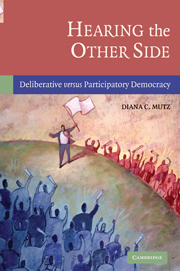2 - Encountering Mixed Political Company: With Whom and in What Context?
Published online by Cambridge University Press: 05 June 2012
Summary
In a 2004 Miss Manners column, a reader wrote in with the following question:
Dear Miss Manners:
In this election year, I am struck by a barrier to participation in the world's most famous democracy – that being Americans' reluctance to consider political discourse to be polite conversation.
In most parts of the world, it might be considered far more engaging dinner conversation to contrast the qualities of candidates for office than, say, to discuss the less savory sorts of reality television.
I find the rigor with which reasoned political discourse – or even discussion of complex news topics – is quashed as if it's a threat to future generations' participation in our communities. I certainly grew up with animated (but cordial) political discussion in many formal and informal venues.
Yet broach the subject of an election at most dinner tables or cocktail parties and it's as though you were discussing something shameful or utterly beyond proper behavior.
My European friends are actually shocked at the lack of casual discourse on political matters here, and frankly so am I.
Could you please elaborate as to the proper place of free speech in mixed company?
Miss Manners responds:
You mean people of mixed political opinions, who are going to feel free to say what they think about the morals and intelligence of people who disagree with them about politics (or sex or religion, which are also banned from the dinner table)?
Miss Manners suggests you try bringing up a topic from each of these areas – for example, the death penalty, same-sex marriage, or abortion – and see how much polite, cordial and reasoned discourse you provoke.[…]
- Type
- Chapter
- Information
- Hearing the Other SideDeliberative versus Participatory Democracy, pp. 19 - 56Publisher: Cambridge University PressPrint publication year: 2006



